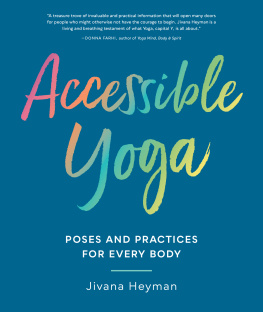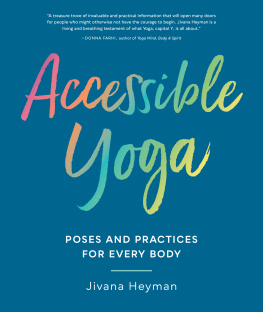Contents

Yoga Therapy
for Diabetes
EVAN SOROKA
Illustrated by Kirsteen Wright

Contents
Introduction
We All Have a Story to Tell
This is mine, at least part of it, for now. It is a story that I wrote under the influence of diabetes. Every word is imbued with the lived experience of diabetes in me. I write from that place but also from beyond that place. As it is part of me, but not really me.
My story is not particularly unique or special, but it is mine. I could have been another statistic, a victim of diabetes, but instead, I am here sharing this story with you. I hope that my diabetes journey can show others that you are never alone with diabetes, even when it feels like no one gets it. You are never really alone.
Im a Colorado girl; being in nature has always been part of my life and upbringing, so it is fitting that this is where I figured out I had diabetes. It was the summer between seventh and eighth grade. I was on the cusp of adolescence, a pivotal time in anyones life. The months leading up to my diagnosis were foreboded with the typical warning signs of diabetes, and looking back, it was too close to see.
All I remember is the feeling: a violent thirst like a hungry wolf would pull me up out of bed every night. I wet the bed the night before my bat mitzvah; gosh, if the other kids only knew. For the most part, I kept all of the warning signs to myself. I knew something was wrong, but I chose to ignore it with the hope it would go away. That intuitive whisper never got louder; but it never went away, and when things were quiet, I could hear it calling me.
That year was the eighth-grade solo, a trip we excitedly anticipated and secretly dreaded. The apex was an unofficial rite of passage into high school, a 24-hour solo excursion with just a candy bar, a bottle of water, and a tarp. Our camp was at treeline above 11,000 ft, high in the Colorado mountain tundra. A valley of alpine flowers meets jagged ominous peaks. The ground is soft and slightly moist from the snowmelt. I found a sheltered overlook laden with trees, perfect for my new abode. Below was a high alpine stream, the only sound perceivable to my young ears.
Within the first hour, I drank my entire water supply. Too proud to ask for help, I toughed it out for the remaining 23 hours. All I remember was the sound of that stream and the feeling inside like an evil gremlin possessing me.
Silence allows you to listen. In the silence of the mountains, for the first time in my life, completely alone, I could finally hear what my body had been telling me for months. Something was terribly wrong; I could not ignore it any longer. It was more than a feeling; it was a deep calling from my soul to take action.
A few days later, in the hospital, my blood sugar was off the charts. They told me I had something called juvenile diabetes and said that it was an anomaly I was still alive. My parents were shocked and ridden with guilt for not having seen the visible signs of diabetes. But how could they? I hid my suffering so well. I should have been devastated; instead, I was relieved.
You lie there in bed, people come to see you. Family, doctors, nurses, friends, everyone looks at you like youre sick. Its like youve got to handle their pain for them. Im fine, Ive got this. Friends come to visit. They say they are sorry and bring you chocolate. Everyone has something to say, nobody gets it. Learn this, do that. Youre expected to absorb it somehow. But nothing can prepare you for a life with diabetes. Nothing except doing it. Not a single thing you learn from a book makes sense until you apply it in your life. Diabetes proficiency is gained by living it.
Any diagnosis is stressful, but as a pre-teen, you are just trying to figure out who you are. All of a sudden, you are required to be highly disciplined and aware of everything that you are doing, as it relates to your health. You are supposed to keep your blood sugars in a tight range of 80180 mg/dL (4.410.0 mmol/L) and inject insulin several times a day.
Suddenly you have to think about food. There is good food, bad food, and everyone has an opinion about what that is. Everything you do now has to be considered through a diabetes lens; it feels suffocating.
The moment I was diagnosed, I fervently rejected any attempts by my parents or others to help me do diabetes. I wanted the responsibility to fall entirely on my shoulders. The first time my parents tried to inject me, their trepidation was palpable. Their hands shook with fear of hurting me. It was the first and only time I let them.
On the one hand, the declaration of independence was a positive attribute, and on the other hand, it produced unnecessary drama in my life. I just wanted everyone to let me be and allow me to take care of diabetes on my own. I did not want extra attention, I just wanted to be normal. Anytime I was to go over to a friends house, their parents would receive an instruction manual about how to take care of me. I hated the spotlight and was annoyed that special measures had to be made for me when I knew how to take care of myself.
My parents and I fought a lot. I resisted, rebelled, and retaliated every time there was a question about my blood glucose (BG), what I was eating, or what I should do. That is an excellent way of saying I gave them a lot of reason to worry; I was a wreck.
My behavior was more than teenage angst, it was a product of diabetes and stress. I was so insecure about my body, overwhelmed by diabetes management, and frustrated by adults looming over every decision that I made. It was at a boiling point, and I did not have any outlets for the emotional overflow. Hope was not all lost; underneath the guise of rebellion was a person who cared deeply about her health and wellbeing. I am lucky, and I think that the only reason why I do not have any complications is that no matter what I did, I always tested my BG and tried to correct it if it was off.
My weight fluctuated, as food had become an object of desire; I wanted the things I could not have. When my BG was low, I would binge eat and spend the entire next day abstaining from food in punishment. Eating disorders are a common effect of type 1 diabetes (T1D). Controlling what we put in our bodies gives us a false sense of control when everything else in our lives seems so out of control. I was so uncomfortable in my body that the thought of someone touching me was enough to scream. My A1c (BG average) lingered in the high eights. I tried to work out, but only met frustration when the weight would not budge or my BG would fall.
In junior year of high school, I convinced my parents to let me move to Brazil for a year. In all honesty, I do not think I gave them a choice. Brazil was incredible for me. I was free to make my own decisions with no one looming over me. It boosted my confidence and awakened a curiosity within me to experience as much of life as possible.
Returning in one piece helped me prove to my parents that I could do it on my own, but I still lacked appropriate coping tools and strategies to offset the emotional cost of diabetes. I had turned to smoking and drinking like a lot of teens, but I was relying on it to cope. Diabetes was taking a toll on me, and I could not see it.
One day, my best friend at the time went to a yoga class. We met up afterwards, and she was a different person. Glowing and happy, she did not want to participate in the usual debauchery that the others and I were into. Naturally, I was intrigued, and the next week I went to a class on my own to see what it was about.













